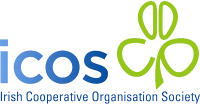
Damien O'Reilly
EU Affairs and Communication Manager, ICOS
Letter from Brussels - February 2023

The war in Ukraine has had a devastating impact, first and foremost, on the country’s innocent people. That goes without saying. It has also had a tsunami-like effect on the world, from displacement of people to food inflation to rocketing energy costs. And, everywhere you look around the corridors of power in Brussels, the war is impacting decision-making too.
Any policy being drafted or designed here in Brussels is against the backdrop of what is happening in Ukraine. And, at its heart is sustainability. Long before the Russian invasion of Ukraine, the EU was focussed on wrapping sustainability around all-new legislation and policy. That included food production under the Farm to Fork element of the EU Green Deal project. Now, the war has refocussed minds on the issue of sustainability. There has been some debate about how the roadmap to the Farm to Fork targets might not be workable while global grain supply and food security are under threat. Nevertheless, the focus on a more sustainable EU remains as sharp as ever.
When it comes to farming and food production, sustainability will have a much broader remit than merely the headline physical adjustments such as less fertiliser use, less pesticide use? and better animal husbandry. The Corporate Sustainability Reporting Directive has been given the important seal of approval by the EU Council. Very soon, large companies which include agri-food businesses will be required to publish detailed information on sustainability matters.
This will increase a company’s accountability, streamline sustainability standards, and ease the transition to a sustainable economy. The EU says: “In practical terms, companies will have to report on how their business model affects their sustainability, and on how external sustainability factors (such as climate change or human right issues) influence their activities. This will equip investors and other stakeholders better when making informed decisions on sustainability issues.” The day of ‘good to have’ from a sustainability perspective – which covers environmental and animal welfare – is over. It is a case of ‘must have’ for agri-businesses because consumers are demanding it. Meanwhile DG Sante (responsible for the EU Commission’s policies on health and food safety) is working away on developing its sustainable food-labelling framework. The aims are familiar:
- To promote sustainable food consumption;
- Empower consumers to make informed, healthy, and sustainable food choices; and
- Incentivise food-business operators to improve the sustainability of their products.
Information focussed on nutrition, environmental impact and animal welfare will become more mainstream on food packaging in a way we only see on specialist food labels in the vegan or organic aisles of the supermarket. The experts here in Brussels say it’s all being consumer driven. And, farmers and food producers must and will respond in kind. The question is, are we – the EU consumers and taxpayers – willing to pay for the higher standards we demand?






